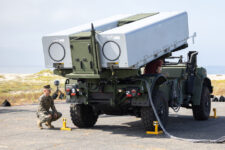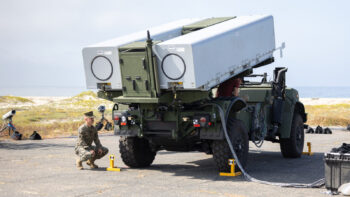
Washington: The military-industrial complex has long been a subject of myth and supposition but it is soon going to become much more substantial. The powerful Aerospace Industries Association is joining with the top defense companies to blunt the push for major defense cuts.
My colleague Jim Wolf, of Reuters, broke the story about what several experts say is an unprecedented push by companies who usually lobby only for their own programs to join together in something close to the mythic view of the military-industrial complex: mighty industrial powers joined together to guarantee the flow of cash into their coffers.
Here’s what Jim wrote:
The site, www.SecondtoNone.org, is to be unveiled formally in coming weeks as part of a drive to build long-term support for the industry — with a special eye on the super committee.
The broad outlines of the stepped-up campaign emerged from a consensus of the trade group’s 16-member executive committee, which includes executives from such top Pentagon suppliers as Lockheed Martin Corp, Boeing Co, and Northrop Grumman Corp.
AIA has retained LMG Inc, a Washington public affairs firm, to help develop its messages and strategy. It is also drawing on the Heritage Foundation, a conservative public policy group, and the Center for Strategic and Budgetary Assessments, a policy research institute, to boost the campaign’s intellectual firepower.
Such a concerted lobby campaign, “…is a major departure from industry norm. As I’ve often said, contrary to pundit and academic thinking, there hasn’t been a military-industrial complex in the lobbying sense. None of the companies has spent time and energy lobbying for the defense budget, they lobby for their individual programs,” said one of the industry’s most respected experts, Joel Johnson, formerly head of international policy for the Aerospace Industries Association.
Johnson noted that the companies traditionally lobby “out of fear that if they didn’t go [to Capitol Hill], the companies that did go would be favored. It’s most hard to get them to cooperate on any defense policy issue — they expect the trade associations to do that.”
But the companies see a Defense Department that has already committed to cutting $400 billion from its budget over the next 10 years — something no other government department has come close to — but still faces the possible loss of another $600 billion should the 12-member so-called Super Congress fail to come up with a plan to cut another $1.2 trillion from the federal budget.
New Defense Secretary Leon Panetta called this the “doomsday mechanism” several days after the Budget Control act was passed by Congress. Panetta said the prospect of such budget cuts — while unlikely — would be so large and require such quick action that he wasn’t even bothering to plan for it. Instead of slashing the defense budget, Panetta said Congress should cut entitlements such as Social Security and Medicare and raise taxes.
One of the more interesting questions for Hill watchers is how the companies will press their case. Johnson, now with the aerospace consulting firm the Teal Group, said he assumes they will, “produce papers and puff pieces on the importance of a strong defense, the worries about China, Iran, etc., and yes, indeed, the vast array of jobs and high-tech individuals that could be displaced with major cuts to procurement.”
On top of that, they’ll lobby lawmakers where they have headquarters and defense plants. One thing that remains uncertain: whether the companies or their proxies will be able to pour lots of money into lawmakers’ accounts. Legislation is pending that would require disclosure of all contributions of $1,000 or more to the 12 members of the Super Congress.
China ‘could beat us to the punch’ to a 6th-gen fighter, Air Force official warns
“It’s fair to say we pay a lot of attention to what the Chinese are doing. And so, not everything that becomes public is a shock,” Andrew Hunter said when asked about new images of purported Chinese fighters. “But having said that, their pace is incredibly fast.”


























